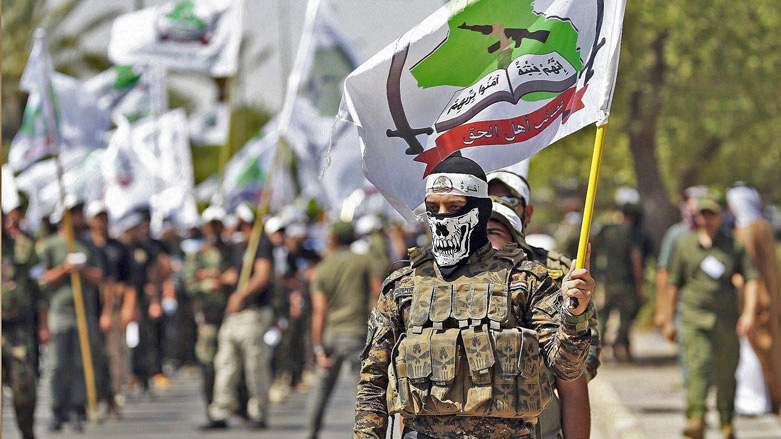US warns Iraq on Iranian-backed militias
“The Iran-backed groups launching rockets at our Embassy are a danger not only to us but to the Government of Iraq, neighboring diplomatic missions, and residents of the former International Zone,” more commonly called the Green Zone, “and surrounding areas,” a State Department spokesperson told Kurdistan 24 on Saturday.

WASHINGTON DC (Kurdistan 24) “The Iran-backed groups launching rockets at our Embassy are a danger not only to us but to the Government of Iraq, neighboring diplomatic missions, and residents of the former International Zone,” more commonly called the Green Zone, “and surrounding areas,” a State Department spokesperson told Kurdistan 24 on Saturday.
The statement followed a day after the highly-regarded Washington Post columnist, David Ignatius, reported that US Secretary of State Mike Pompeo had spoken to Iraqi President Barham Salih on Sunday, using very strong language.
In their phone call, Pompeo told Salih that if the Iraqi government did not rein in the Iranian-backed militias—specifically, Kata’ib Hizbollah and Asa’ib Ahl al-Haq—and their attacks on the Green Zone, the US would close its embassy.
Ignatius noted that the embassy’s closure could be “a prelude to heavy US airstrikes against the militias.”
Ignatius’ column followed on stories that first appeared in the Iraqi press on Tuesday, after a meeting the day before among the senior Iraqi leadership, in which Salih conveyed Pompeo’s warnings.
In addition to threatening to close the embassy, Salih also relayed a more dramatic threat, according to Iraqi24, which Ignatius cited in his story.
“If our forces withdraw, and the embassy is closed in this way, we will liquidate everyone who has been proven to be involved in these acts,” Pompeo reportedly told Salih.
“We will not have mercy on anyone, especially Kata’ib Hizbollah and Asa’ib Ahl al-Haq,” Pompeo said, adding, “The decision to close the US embassy will have very negative repercussions on Iraq and its future.”
This is a final warning to the government to work seriously to deter these terrorist actors,” Pompeo stated.
There is also the possibility of US sanctions, targeting Iraqi individuals and entities, as well as the withdrawal of US support for international economic aid to Baghdad, which has been hard hit by the coronavirus pandemic and the resulting fall in oil prices.
“As the United States works to secure financial support for Iraq from the international community and various private-sector businesses,” the statement from a State Department spokesperson to Kurdistan 24 continued, “the presence of lawless, Iran-backed militias remains the single biggest deterrent to additional investment in Iraq.”
Iraqi Response
The US warnings prompted quick condemnation in Iraq of the militia attacks—including from some surprising parties. The Iraqi cleric, Muqtada al-Sadr, was the first to speak out.
On Wednesday, Sadr charged that the bombings and assassinations carried out by the Popular Mobilization Forces (PMF), known in Arabic as the Hashd al-Shaabi, were “weakening Iraq and its people.”
On Thursday, the Fatah Alliance, a parliamentary coalition of Shi’a militias, led by Hadi al-Amiri, head of the Badr Brigade, joined in condemning the assaults, affirming in a statement, “We declare our rejection and condemnation of any attack targeting diplomatic missions and official institutions.”
The Fatah Alliance, however, includes Asa’ib Ahl al-Haq and Kata’ib Hizbollah—the very militias which the US charges are carrying out the attacks. A spokesman for the latter group subsequently issued a defiant tweet, directed at Washington, “Your threats will return to you, and we will rub you and your soldiers in the dirt.”
Yet on Friday, Sadr affirmed, even more strongly and concretely, the need to end the attacks, as he called for the formation of a committee to investigate assaults on Iraqi government buildings, as well as the offices of international missions in Iraq.
Sadr’s suggestion was immediately endorsed by Iraqi Prime Minister, Mustafa al-Kadhimi, the Speaker of the Iraqi Parliament, Mohamed al-Halbousi, as well as the President of the Kurdistan Region, Nechirvan Barzani.
Read More: Iraq's Sadr calls for probe into militia attacks on federal offices, missions
And on Saturday, Iraq’s Foreign Minister, Fuad Hussein, arrived in Tehran for a two-day visit to meet with senior officials. Prominent on his agenda was to get the Iranians to rein in the militias carrying out the attacks.
The substance of Iran’s response remains to be seen. However, at least on a rhetorical level, Tehran was defiant.
“We consider the presence of US armed forces in the region, whether in Iraq, Afghanistan or the southern countries of the Persian Gulf, as detrimental to security and stability in the region,” Iranian President Hassan Rouhani told Hussein, according to Iranian media.
On January 5, following the US assassination of Gen. Qasim Soleimani, head of the Quds Force of Iran’s Islamic Revolutionary Guard Corps, the Iraqi parliament passed a resolution calling for the expulsion of US forces from the country.
“We consider what the Iraqi parliament and the representatives of the Iraqi people passed in this regard as a positive step which is supported by the Iraqi nation and us,” Rouhani reportedly said.
Editing by John J. Catherine